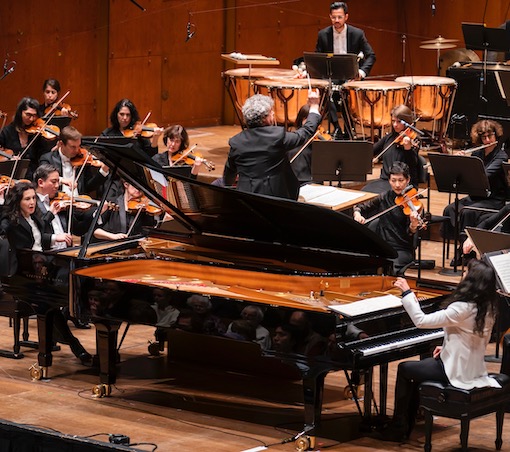Bruch and Strauss prove a congenial pair for Bychkov, Philharmonic

Two showpieces were on tap at Lincoln Center’s David Geffen Hall Thursday night as the New York Philharmonic presented Strauss’s grand Ein Heldenleben (A Hero’s Life) and Bruch’s glossy Concerto for Two Pianos, each in its own way promoting virtuous stubbornness as something to be admired.
In Strauss’s towering self-portrait, it’s the iron belief in his own heroism as a striving artist. In Bruch’s romantic concerto, it’s the composer’s resolute indifference to game-changing developments in orchestral music wrought by contemporaries including Stravinsky and Bartok.
Because Strauss is Strauss, and calling his work dated would be like calling music itself so last year, Bruch’s heavy, decorative concerto has aged less well of the two pieces. But both received engaged and attentive readings from the orchestra led by guest conductor Semyon Bychkov and with sisters Katia and Marielle Labèque on dueling pianos for the Bruch.
Bruch’s half-hour concerto was something of a reclamation project for the Philharmonic, which hadn’t presented it since giving its New York premiere in 1917 with another, apparently less capable sibling duo, Rose and Ottilie Sutro of Baltimore. Bruch wrote the piece for the Sutros, who repaid the gesture by quietly editing his demanding score down to a level of play they could handle, and then copyrighting their diluted take.
Bruch, over in Europe, never knew. It wasn’t until the 1970s after the Sutros had died that a Bruch scholar was able to reconstruct the original score from estate records.
The Labèques had no trouble playing the concerto as Bruch intended. The duo recorded it for a 1993 Phillips album with Bychkov, who is married to Marielle Labèque, and the work remains a staple of the sisters’ concert repertory. As they faced one another Thursday from across a pair of Steinways, looking like a mirror image, their rapport was audible in the concerto’s ever-shifting mix of unison play and syncopated interaction through a curtain of orchestration.
The doubling of lines in the first movement Andante produced a pleasantly weighty, doleful timbre with strings humming sympathetically in the background. An air of doomed romance pervaded the second movement at its outset, as cellos, brass and then a solitary oboe sounded out in succession, until the Labèques stepped in with galloping parallel runs and diverging flights of fancy.
The third movement Adagio eased off the fireworks, and the Labèques responded with soft, contemplative playing which, at moments, seemed to lull the entire orchestra until Bychkov summoned horns to cut through the approaching fog. The closing fourth movement began with an almost choral feel, and gathered steam and tension toward a bracing finish. Still, Bruch’s stoic romanticism feels like a curiosity as much as anything, and it wouldn’t be a surprise if the Philharmonic went another century between repeats.
The Labèques were even more impressive in their encore, playing the last quarter of Philip Glass’s Four Movements for Two Pianos, their technique and chemistry blazing in the foreground of a dense but propulsive work.
Well before Teddy Roosevelt’s famous “man … in the arena” speech, Richard Strauss composed Ein Heldenleben in no small part as a rejoinder to his critics, but also in tribute to, well, himself. Hearing this summation of his work to date, one can imagine the composer up on a parapet surveying the general awesomeness of his endeavors.
Heldenleben is a 45 -minute tone poem that is Homeric in scope and sweep, from its pole-vaulting first arpeggio onward, and Bychkov and the Philharmonic captured its infectious, stirring character from the opening movement, where strings climb and horns dive in dizzying aerial formation. If anything, the orchestra came to the first movement’s dramatic full stop a bit too abruptly, with no lingering on the epic pause.
The urge to jump right into the witty second movement, with its nattering reeds as the embodiment of Strauss’s peck-pecking detractors, was apparently too much to resist. The heightened applause after the symphony for principal flutist Robert Langevin was acknowledgement of how perfectly, and playfully, the woodwinds handled their role as the heavies of this tale.
The third movement is a portrait of Strauss’s wife, Pauline de Ahna, as “The Hero’s Companion” — and a serious companion, at that. This movement, the longest of six, belonged primarily to concertmaster Frank Huang, who met the orchestral surges head-on with scorching violin lines and cadenzas that thrilled, and led the way into a more harmonious, wistful close.
The fourth movement, “The Hero at Battle,” was the most entertaining for sheer orchestral color and bravado. With its rolling snares and flaring horns over rumbling strings, it was a convincingly stormy evocation of warfare as a noble, almost romantic undertaking. The fifth movement, “The Hero’s Works of Peace,” is renowned for Strauss’s serial quotation of his earlier works — a kind of hit parade that flows into a major-key pastoral section you might find in any number of Strauss works.
Bychkov steered the orchestra through this self-referential collage sure-handedly, and into the reflective final movement, “The Hero’s Retirement from this World.” One more blast of discord served as a reminder that a hero’s work is never truly done, and a last, bittersweet violin break for Huang underscored our protagonist’s departure, his war with the nabobs at an end (for now).
A last, fading echo of Strauss’s Also Sprach Zarathustra, preceded a finish that was so quiet, the first applause was tentative, as if the audience wasn’t quite sure Strauss had finally ceded the stage.
The program repeats 2 p.m. Friday and 8 p.m. Saturday. nyphil.org


